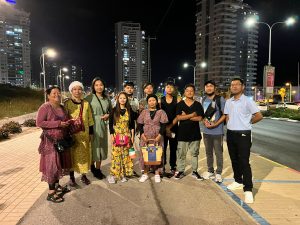Close to 4,000 people from India’s Northeast have emigrated to Israel so far in a movement that began almost four decades ago after Biblical links stretching back thousands of years were established.
As many as six batches of people from the Indian states of Mizoram and Manipur have settled in different parts of Israel after it was ascertained that they belong to the Bnei Menashe, the descendants of one of the 10 lost tribes of the country who were sent into exile by the Assyrian Empire more than 2,700 years ago. “Their ancestors wandered through Central Asia and the Far East for centuries” before settling in some regions in northeastern India, according to Shavei Israel, an organization devoted “to ‘lost’ and ‘hidden’ Jews around the world.”
In 2005, the Rabbinic Court of Jerusalem recognized the Bnei Menashe community as one of the 10 lost tribes of Israel.
The community comprises members from the Mizo, Kuki, and Chin ethnic groups of Mizoram and Manipur, who speak Tibeto-Burman languages. An estimated 7,000 members remain in India’s Northeast, awaiting the chance to return to their ancestral land.
The emigration of the Bnei Menashe to Israel follows a similar movement to the Bene Israel of Maharashtra that started many decades ago. Less than 5,000 members of the community are in India, most of whom are residents of Thane.
Azriel Hmar, who emigrated to Israel with his family in 2014, told The Diplomat that the families have settled at several locations across the country in cities such as Afula, Nazareth, Tiberias, Akko, Bethel, and Beit Shean. They are employed in diverse industries ranging from electronics and food processing to the manufacturing of defense items.
“The scheme for settling immigrants in Israel is well organized, which begins from granting citizenship. Subsequently, we were provided with houses at concessional rates and a language course (Hebrew) of six months. We never faced any problem except the language,” said Azriel. He pointed out that the scarcity of labor in Israel offered immense scope to switch jobs from one industry to another, which also explains the huge presence of foreign workers in the country.








































